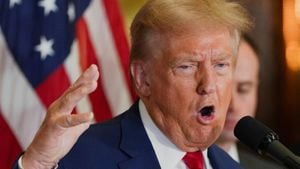Across the strife-ridden streets of Maputo, the air has been thick with tension and outcry following Mozambique's recent elections, marked by protests and violence. With the announcement of Daniel Chapo as the presidential frontrunner for the ruling FRELIMO party, unrest has surged, prompting concerns both within and outside the nation.
Since the government declared Chapo the winner of the October 9 elections, demonstrators have taken to the streets, alleging widespread electoral fraud. International Relations and Cooperation Minister Ronald Lamola of South Africa has addressed these protests, vehemently denying claims of government complicity with the ruling party. Instead, he urges recognition of the election process pending intervention from Mozambique’s Constitutional Court.
"We can’t not do what is the norm, what is established practice because we are seen to be protecting our friends," Lamola remarked during his briefing. This response is even more potent considering the stakes—at least 40 lives have been lost amid the protests, with numerous others suffering injuries as violence erupted.
Accompanied by heavy security, the unrest prompted temporary closure at the Lebombo border, significantly impacting trade routes with South Africa. Fortunately, the border has since reopened, allowing for renewed passage of goods, something Lamola applauded as pivotal for restoring commerce and normalcy between the nations.
Reports indicate over 17 million Mozambicans registered to vote, yet only around 43% actually participated, igniting discussions around the legitimacy of the turnout and the electoral process. Lamola highlighted these concerns, citing the need for Mozambique’s law enforcement to expedite investigations related to the violence and unrest. “We regret the loss of lives and destruction of property,” he stated, reflecting South Africa’s concerns for its neighbors' stability.
With the Southern African Development Community (SADC) set to convene on November 20, 2024, to discuss political developments, thoughts remain focused on how the feedback from these protests will be integrated. The wider regional diplomatic effort will aim to assess not only the tensions following the elections but also the overall democratic processes across the SADC member states.
Maputo's streets have been alive with calls for justice as protesters demand accountability from the FRELIMO party and the government. Many youths, disheartened by perceived electoral discrepancies, rallied behind independent candidate Venâncio Mandlane, solidifying their stance against what they deem as systematic manipulation.
Despite the turmoil, Minister Lamola continues to push for patience and restraint from the Mozambican populace. He emphasized allowing judicial processes to settle disputes over election results, saying, "We reiterate our calls for calm and restraint to allow the electoral process to conclude successfully,” indicating South Africa's diplomatic stance as one rooted not merely in neighboring alacrity but grounded on supportive regional frameworks.
Efforts to bring all parties to the table remain at the forefront of Lamola's strategies, as he seeks to de-escalate tensions and encourage constructive dialogue between stakeholders. He has welcomed the evaluation of the elections by the SADC, asserting its significance for the region's political health and electoral integrity.
With the interplay of local protests and international observation, Mozambique stands at a crossroads. How the country's citizens engage with these dynamics and what role regional neighbors, especially South Africa, play will not only shape Mozambique's immediate future but potentially redefine political relationships across Southern Africa.
Acknowledging the significance of the current challenges, Lamola invites unity and cooperation among all involved parties, urging everyone to respect procedures and encourage legal pathways for resolution of electoral grievances.
"What’s important is observing democratic norms and ensuring these elections meet necessary criteria for legitimacy," he stated, embodying South Africa’s diplomatic essence as they now play both the neighborly and watchful role.



